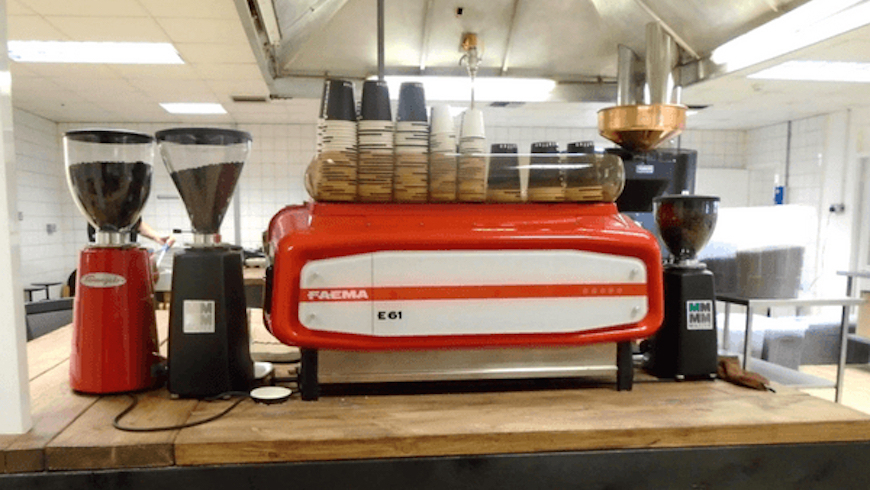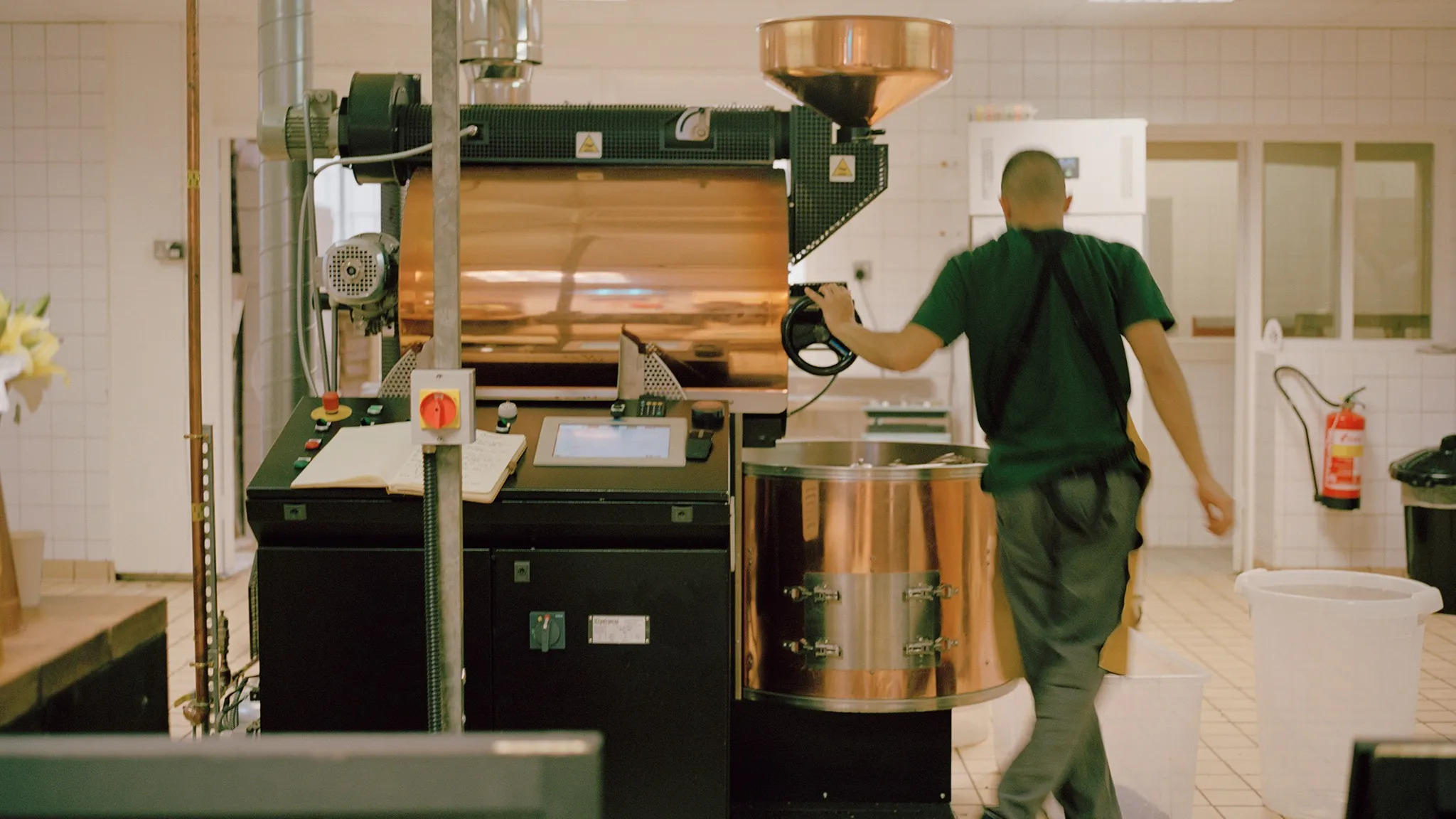HM PRISON AYLESBURY HAS PAIRED UP WITH REDEMPTION ROASTERS TO HELP YOUNG PEOPLE SKILL UP FOR LIFE AFTER PRISON
The scene is a familiar one. Two baristas, with shaven heads and tattoos, are hard at work. Having tamped down the coffee before carefully filling the cups, they slide a couple of freshly made lattes across a blue mat. Nearby, a colleague pours beans into a state-of-the-art Petroncini roaster from sacks that have been carefully stamped with the words “Mercanta, the Coffee Hunters”.
Look closer, though, and it’s clear that nearly everything about this scene is unusual. I am in the Redemption Café at HM Prison Aylesbury, a young offenders’ institution for 17- to 21-year-old men serving long sentences, and home to the world’s only coffee roaster within a prison. From here, and under the label of Redemption Roasters, the roasted coffee is packed into kilo bags, bearing the names Aylesbury and 1847 (the year the prison was built) and then dispatched to the company’s warehouse in Dorset and, from there, to its growing number of wholesale and retail customers in the UK and Germany.
The seeds of this association were sown in April 2016 at the London Coffee Festival when Lee Johnson, then head of reducing reoffending at Aylesbury, approached wholesalers Max Dubiel and Ted Rosner with a simple question: would they consider working with prisoners with a view to these young men being able to find employment as coffee baristas on their release?
As Dubiel and Rosner thought the proposition over, they wondered if they could take it a stage further and actually roast their coffee in a prison. As wholesalers, they knew that roasting your own coffee provides much greater control over the finished beans but that finding and financing a coffee roaster can bring a heavy financial burden. As Johnson considered their counter-proposal, Dubbiel and Rosner merged their business with another, run by Harry Graham who, when I catch up with him at Aylesbury, is forthright about how the roastery was eventually financed.
“The prison offered us this space, which was a former kitchen and had some of the necessary ventilation,” he explains. “The transformation cost over £80,000, money we raised via our backers. This was not easy as the prison has a fairly restrictive code of practice on even which plumbing company can be used. But now we’re established and are roasting up to three tonnes of coffee beans a week.”
Quickly dismissing any suspicions of exploited labour, Graham assures me that Redemption Roasters pays the prison a rent with which it in turn pays the prisoners. The costs of shipping large quantities of raw materials in and out of prison can actually be as much as three times higher than in a conventional commercial situation, he adds.
Dressed in a grey jumper and grey trousers, with short cropped hair, Graham doesn’t look out of place among the prison officers (in his pocket he conceals a large ring of keys entrusted to him by the prison). And, when it comes to roasting coffee, nobody is likely to argue with him. With his help, selected prisoners learn to roast the beans, to master the basic arithmetic skills that many of them lack, and to deal in a comfortable and relaxed manner with customers.
The 10 students chosen for each course begin their apprenticeship on a classic Faema E61 coffee machine that is used as their training bar. Here they learn about coffee beans, how to set up and dismantle the coffee grinder, how to grind the beans, how to clean the espresso machine and, effectively, how to make a top-class cappuccino.
After a fortnight they are tested — on the origins of the coffee and on the make-up of the most common drinks — and, once they have passed, they are rewarded with their own barista kit, an apron and a tamper, which can be embroidered with anything. Graham shows me one on which the words “Don’t forget the cup” had been embroidered, for a student who used to let the coffee overflow.

At this stage, the students can then move on to the very modern Faema espresso machine and are free to make their own drinks. With this apparently comes the first change in their mentality and attitude. This extra knowledge of coffee appears to imbue the prisoners with a sense of self-respect that is a distinguishing feature. “You may be Mr Big on the wing but that means nothing in here,” one young offender explained to me. “It may be a jail out there but in here it is a café.”
Marc Wioland, a warder who has been enlisted as Graham’s right-hand man on the project, agrees. “When you are in here, you are treated like an employee, not like a prisoner because you are fulfilling a real-life job,” he says when asked about the effect that working in the café has had on the inmates. What’s not in doubt is the quality of the coffee here, as good as any speciality roaster, even if the rather hidden location of the café, tucked away in the centre of the prison, means few outside of staff and visitors get to taste it.
Like all prisons, Aylesbury is not without problems. A report by Her Majesty’s Inspectorate of Prisons earlier this year showed that violence and drug activity had risen and that safety was a “major concern” at the institution. But in a tough environment, the Redemption Roasters’ experiment fulfils a crucial role — it helps create a semblance of normality in the inmates’ lives. Can it also be a step on the road to rehabilitating these young offenders, many of whom have years left to serve in prison?
It won’t be easy: just 17 per cent of those who leave prison manage to find a job. However, those who have the opportunity of employment on release are far less likely to reoffend. This barista training, and the confidence it helps inspire, can go some way to equipping the offenders when they step back into the outside world. In a small room to the side of the café, I sit with Cornai who still had a few months of his sentence left. He seems quietly confident of a future in coffee. “I have learnt so much working in here and I believe now that I have a set of skills that will allow me to earn a proper living on the outside. Once I get released and get home I intend to find a job putting into practice all that I have learnt.”
